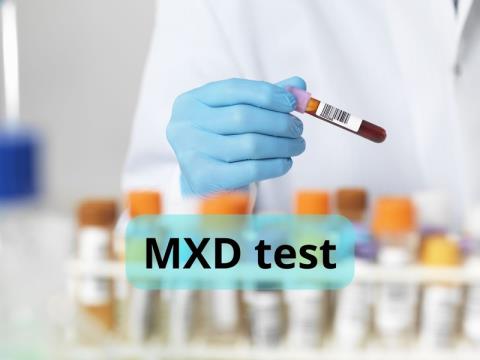Lung cancer is a dangerous disease that often occurs in people who smoke or who are often exposed to toxic environments. Metastatic lung cancer is the advanced stage of the disease. Many people wonder if metastatic lung cancer is contagious or not? Let's see this article to explain whether metastatic lung cancer is contagious!
Metastasis is the word used to describe the spread of cancer in general. Unlike normal healthy cells, cancer cells have the ability to grow outside of where they originated. When that happens, it's called metastatic cancer. Lung cancer metastasis is a phenomenon where cancer cells can break away from the cancer site in the lung and enter the bloodstream, moving around in the circulation to reach "new bases", causing new cancer tumors in other areas. other parts of the body.
During lung cancer metastasis, lung cancer cells actively break away from where they first formed – the primary cancer, travel through a system of blood vessels or lymphatics and form new tumors – metastatic tumor. Is metastatic lung cancer contagious?
Lung cancer often metastasizes to which parts of the body?
Nearly all cancers have the ability to metastasize. According to the blood circulation, lung cancer can metastasize wherever it wants in the patient's body. However, there are 5 organs that most commonly metastasize lung cancer: lymph nodes, liver, bones, brain and adrenal glands.
In rare cases, late-stage lung cancer can also spread to other organs such as the stomach , large intestine, small intestine, pancreas, skin, eyes or even metastases. to the breast.
Nearly all cancers have the ability to metastasize
What causes lung cancer to metastasize ?
Lung cancer cells develop when normal cells, for some reason mutate, divide, spread and become cancer cells. These cancer cells, continue to multiply but do not disappear, until it forms a large tumor in the lung.
As this tumor grows and becomes difficult to control, it begins to occupy more of the surface of the lung and begins to spread to other areas. This stage is called the beginning stage of metastatic lung cancer.
Cancer cells spread in two ways:
- Direct penetration to the nearest location.
- The cells break away from the primary tumor and travel through the bloodstream or lymphatic systems.
Symptoms of lung cancer beginning to metastasize
Metastatic lung cancer does not always present symptoms. If symptoms of metastatic lung cancer appear, they will depend on where the cancer cells have entered. Here are some common symptoms of metastatic lung cancer:
Lung cancer cells metastasize to adrenal gland
Lung cancer that has spread to the adrenal glands usually causes few or no symptoms. However, it can lead to a decrease in hormone levels in the adrenal glands. This makes the patient feel weak and tired often.
Lung cancer with bone metastases
Approximately 30-40% of patients with end-stage lung cancer develop bone metastases. At this stage, the patient shows symptoms such as: Pain in the back , pain in the knee joints ... In addition, the risk of fracture in the patient also increases gradually when this symptom worsens.
Lung cancer metastasis to the brain
About 20-35% of patients with lung cancer develop metastases through the brain. Patients with brain metastases may experience symptoms such as headache , fatigue, confusion, nausea, and weakness.
Lung cancer metastasizes to liver
Patients with lung cancer metastasized to the liver have symptoms such as nausea after eating, loss of appetite or pain under the right rib...
Lung cancer that travels through the lymph nodes
The patient may have enlarged lymph nodes in the armpit, neck, and stomach. However, these lymph nodes are also enlarged.
Is metastatic lung cancer contagious?
Is metastatic lung cancer contagious is a question and worry of many patients as well as the patient's family. Experiments and studies at The University of Kansas - USA have shown that: Metastatic lung cancer is a disease caused by mutated cells in the body, not by bacteria or other pathogens. directly caused by viruses like other infectious diseases. Therefore, it can be affirmed that: Lung cancer or metastatic lung cancer is not contagious, so it cannot be contagious.
However, lung cancer is not contagious but can be inherited. According to the Cancer Society, some lung cancers are influenced by family history. There are many cases in the lifetime of grandparents who had lung cancer, and their children did not get it, but the descendants got it because they already had a mutated gene, in addition to other physical agents that made these cells become the primary cause of cancer. cause lung cancer.
Is metastatic lung cancer contagious is a question of many patients
How to prevent metastatic lung cancer
Nowadays, nothing is more precious than health. Periodic lung cancer screening helps to detect the disease early, if any, to have timely treatment before the cancer metastasizes is an important issue. Here are the cases that need to be screened for lung cancer early:
- People over 55 years old.
- Family history of lung cancer.
- People who have smoked for 15 years.
- And those who are smoking.
In addition, the following things should be done to prevent lung cancer and lung cancer from spreading:
- Not smoking is the most important lung cancer prevention measure for reducing the risk of primary lung cancer.
- Stay away from cigarette smoke and limit your exposure to harmful substances such as: Asbestos, radon, chromium, arsenic and nickel… Non-exposure will reduce the risk of disease significantly.
- Use safe and nutritious foods. Do not use foods that have expired or contain many unknown ingredients.
- Exercise regularly and have a reasonable rest regime to ensure health.
You should have regular health check-ups to screen for lung cancer
Treatment options for metastatic lung cancer
Treatment for metastatic lung cancer often focuses on controlling the cancer's progression to relieve symptoms. If cancer cells have spread, it is difficult to completely remove them from the body. Treatment depends on the type of lung cancer, on the location of metastases, and on the health of the patient. Treatment options for metastatic lung cancer include:
- Chemotherapy : When cancer cells have spread to most areas of the body.
- Radiation therapy : When cancer cells have spread to only a certain area of the body.
- Laser Therapy: Using a laser to burn off part of a tumor.
- Medications: Medications are used to treat symptoms, such as steroids, pain relievers, or muscle relaxants.








